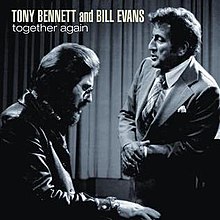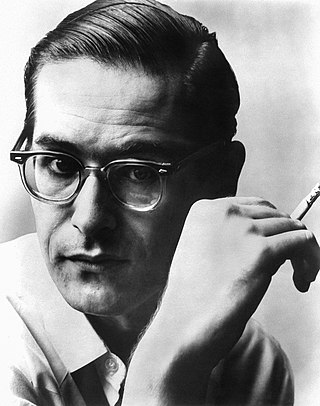
William John Evans was an American jazz pianist and composer who worked primarily as the leader of his trio. His use of impressionist harmony, block chords, innovative chord voicings, and trademark rhythmically independent "singing" melodic lines continue to influence jazz pianists today.
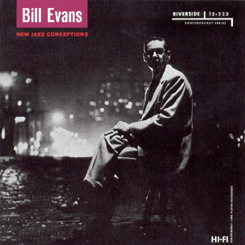
New Jazz Conceptions is the debut album by jazz pianist Bill Evans, recorded in two sessions during September 1956 for Riverside Records.

The Tony Bennett Bill Evans Album is a 1975 studio album by singer Tony Bennett and pianist Bill Evans.

Everybody Digs Bill Evans is a trio and solo album by jazz pianist Bill Evans. It was released in early 1959 on the Riverside Records label.

You Must Believe in Spring is an album by American jazz pianist Bill Evans, recorded by him with bassist Eddie Gómez and drummer Eliot Zigmund in August 1977 and released in February 1981, shortly after Evans's death in September 1980.

I Will Say Goodbye is an album by American jazz pianist Bill Evans, recorded in 1977 but not released until January 1980. It was his final album for Fantasy Records, making the title quite appropriate.

Bill Evans Trio with Symphony Orchestra is an album by American jazz pianist Bill Evans and his trio, released in 1966, featuring jazz arrangements of works by classical composers Granados, J.S. Bach, Scriabin, Fauré, and Chopin. The trio is accompanied by an orchestra consisting of strings and woodwinds arranged and conducted by Claus Ogerman. Originals by both Evans and Ogerman are also included.
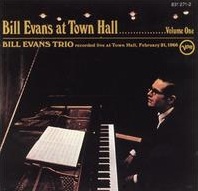
Bill Evans at Town Hall is a live album from 1966 by American jazz pianist Bill Evans and his trio. It is his only commercial trio recording featuring drummer Arnold Wise, and it was the last recorded appearance of bassist Chuck Israels as a regular member of the trio.
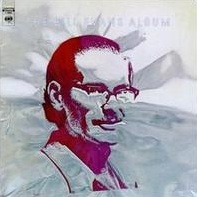
The Bill Evans Album is a recording by the jazz pianist Bill Evans, released in 1971 on the Columbia label. It was his first album to feature all compositions written, arranged, and performed by him. On the record, Evans plays both an acoustic and a Fender Rhodes electric piano.

Quintessence is an album by American jazz pianist Bill Evans. It was recorded in 1976 for Fantasy Records and released the following year. At this time usually playing solo or with his trio, for these sessions Evans was the leader of an all-star quintet featuring Harold Land on tenor saxophone, guitarist Kenny Burrell, Ray Brown on bass, and Philly Joe Jones on drums.
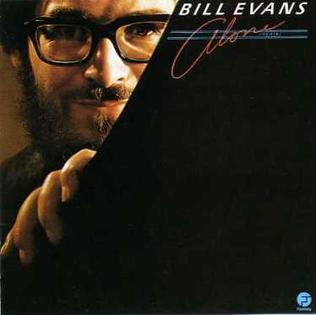
Alone (Again) is a solo piano album by American jazz pianist Bill Evans, recorded in December 1975. A follow-up to his earlier solo album Alone, it was released in 1977 on Fantasy Records and reissued on CD in 1994 by Original Jazz Classics. At the time it was recorded, Evans had been playing an increasing number of solo dates and was inspired after hearing Marian McPartland play solo in Monterey. Evans's manager Helen Keane commented:
As much as Bill enjoyed playing alone at home, and although by this time he regularly included a solo section in his concert program, he found recording in this context very difficult. It was probably the only area he felt insecure about musically, and the fact that he'd gotten a Grammy for Alone didn't seem to help.

From Left to Right is an album by American jazz pianist Bill Evans, released in 1971. It was recorded with his regular bassist Eddie Gómez and drummer Marty Morell and with an orchestra arranged and conducted by Michael Leonard. This was the first album on which Evans played a Fender Rhodes electric piano.

Intuition is a jazz album by pianist Bill Evans and bassist Eddie Gómez released by Fantasy Records in 1975.

Waltz for Debby is a 1964 album in English and Swedish by the trio of American jazz pianist Bill Evans and the Swedish singer Monica Zetterlund. Evans met her on a tour of Sweden and was "bowled over" by her EP recording of "Waltz for Debby" with a Swedish text titled "Monicas Vals." Evans's manager, Helen Keane, set up a recording session for them at the end of the Swedish tour.
"Waltz for Debby" is a jazz standard composed by pianist Bill Evans, which became "his most famous tune." He first recorded it as a brief solo piano piece on his debut album, New Jazz Conceptions (1956). Lyrics were added about six years later by Evans's friend Gene Lees. "Debby" in the composition's title refers to Evans's then 3-year-old niece, Debby Evans, whom he often took to the beach.
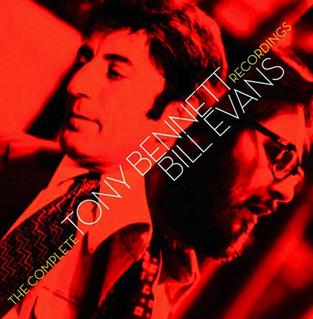
The Complete Tony Bennett/Bill Evans Recordings is a two-CD box set released in 2009 compiling the two recording sessions by singer Tony Bennett and pianist Bill Evans which produced The Tony Bennett/Bill Evans Album in 1975 and Together Again in 1976, including twenty alternate takes and two bonus tracks not released on the original albums.

Montreux III is a live album by jazz pianist Bill Evans and bassist Eddie Gómez, recorded at the Montreux Jazz Festival in Switzerland in 1975 and released on the Fantasy label.

Time Remembered is a live album by jazz pianist Bill Evans with Chuck Israels and Larry Bunker partially recorded at Shelly Manne's club in Hollywood, California in May 1963, but not released until 1983 on the Milestone label as a 16-track double LP. It would be later reissued on CD in 1999, with only 13 tracks. The trio performances were recorded at the same sessions that produced At Shelly's Manne-Hole (1963) and were first released on Bill Evans: The Complete Riverside Recordings (1984). The four solo performances were recorded in a separate session in April 1962 in New York City. "Some Other Time" was recorded in December 1958, in New York City.

The Mathis Collection is a compilation album by American pop singer Johnny Mathis that was released in the UK in 1977 by CBS Records. The subtitle on the cover reads, "40 of my favorite songs", and a statement from Mathis in the liner notes says, "Songs are very personal things. On this double album I have attempted to put together a collection of those which are most meaningful for me. I hope they mean as much to you." The compilation includes six of the 12 songs that had reached the UK singles chart by the time of its release but focuses mainly on album tracks.
"Funkallero" is a jazz standard composed by the pianist Bill Evans in the mid 1950s. Evans biographer Peter Pettinger notes that it bears "more than a passing resemblance to Bud Powell's 'Un Poco Loco.'" Evans himself said of his composition, "I was getting into kind of a swing thing, and this line just naturally came out of that feeling. It's a natural vehicle for blowing."
